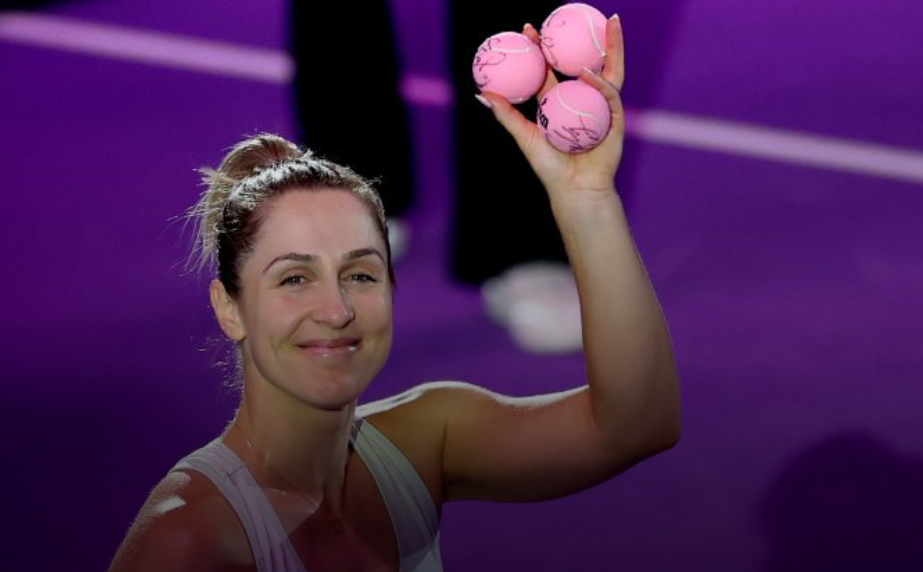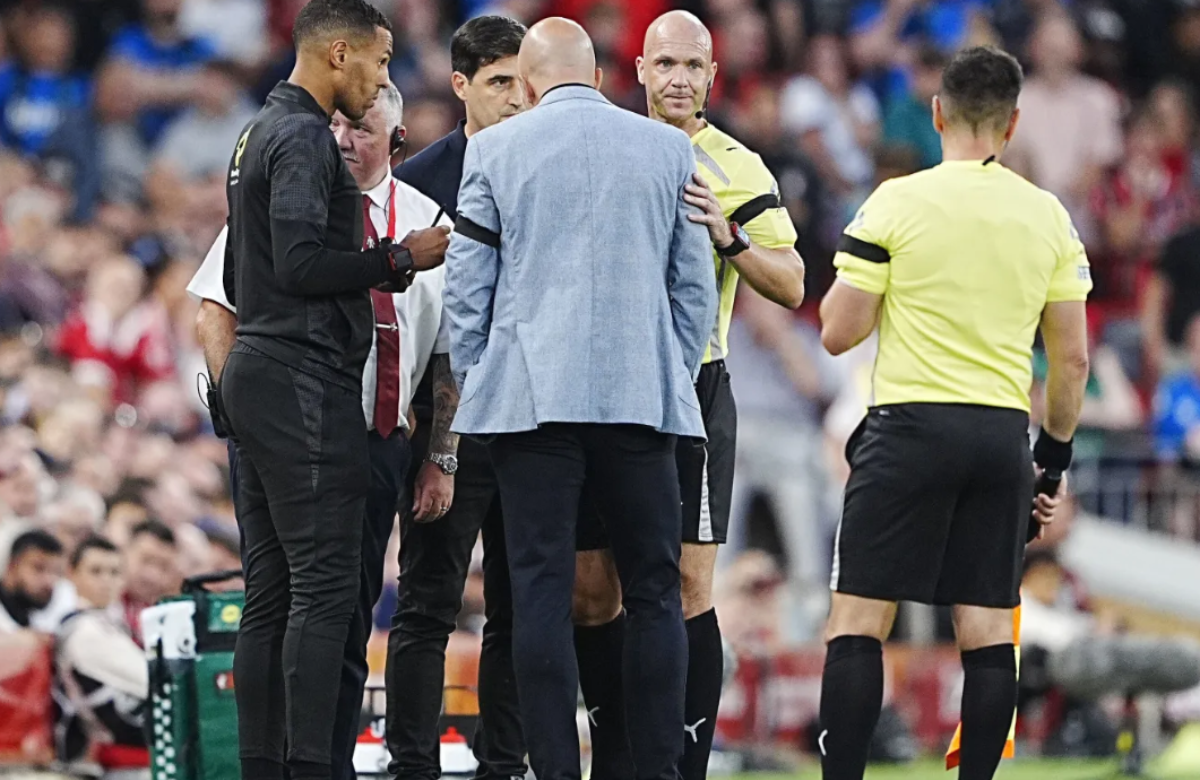Gaby Dabrowski had one of the most successful years of her tennis career in 2024, achieving major victories while silently dealing with a personal health challenge.
It wasn’t until New Year’s Eve that Dabrowski, one of the top doubles players globally, revealed she had been diagnosed with breast cancer back in April. This revelation cast a new light on everything she accomplished throughout the year, including an Olympic bronze medal in mixed doubles and a win at the season-ending WTA Finals, making these achievements even more remarkable.
During her recovery, just two weeks before the start of the grass-court season, Dabrowski was unable to toss the ball into the air for a serve due to limited mobility in her left arm. She had to rely on her coach to throw the ball for her during practice.
However, just a couple of months later, Dabrowski found herself in Paris, proudly wearing her Olympic bronze medal, having fulfilled a lifelong dream. Even more impressive was that she and her partner, Erin Routliffe, reached the mixed doubles final at Wimbledon just weeks earlier, all while Dabrowski had paused additional cancer treatments to keep competing.
Dabrowski believes her success was fueled by a shift in perspective brought on by her cancer diagnosis, leading her to develop a deeper appreciation for the life she was living.
“I really felt like it was such a cool thing to be able to play tennis as my profession, and I felt very grateful for the opportunity to do that,” Dabrowski shared.
She reflected on her 2024 success, noting that the results didn’t come from a desire to achieve them, but from truly enjoying the journey. “What I noticed is that the results I had last year didn’t come because I wanted them, they came because I was enjoying what I was doing… really finding joy in an achievement that came not from dreaming about it at night necessarily, but from sticking to my process of how I wanted to improve my tennis.”
This mindset was particularly evident during the Paris Olympics, where Dabrowski battled through health challenges on her way to securing a bronze medal in mixed doubles with Félix Auger-Aliassime.
For Dabrowski, the tournament wasn’t focused on winning a medal; it was about getting through “a couple of really tough days.”
“Honestly, I went to sleep thinking about how I was going to survive the next day,” she recalls. “What I was going to try to eat, hopefully I would sleep well, and if I didn’t, how I would manage that. I broke things down into very small, achievable wins… And then a good result came.”
Dabrowski’s cancer journey began in the spring of 2023 when she first noticed a lump in her left breast. A doctor at the time reassured her that it was nothing to worry about, so she let it go.
However, during a routine physical with the WTA the following year, another doctor advised her to have the lump scanned. What followed was a rapid series of events: a mammogram, an ultrasound, and a call from the radiologist urging her to get a biopsy right away.
“It turned grim very quickly,” Dabrowski says. But soon after, the news took a more positive turn.
“I eventually got good news after good news after good news in terms of my staging, the size of the tumor, my Oncotype DX scoring, which determines if you need chemo or not,” she adds.
Fortunately, she didn’t require chemotherapy because her score was low enough, and there was no spread to her lymph nodes. She recalls thinking, “Okay, this was scary, but I’m also super grateful that I’m handling this quickly and I’m still at an early stage.”
The WTA, in collaboration with medical technology company Hologic, provides annual health screenings for players on the Tour, covering areas like body composition, bone density, pelvic health, mental health, and Ob-Gyn issues such as fertility and postpartum recovery. This year, screenings are taking place at the Miami Open.
Players are also given access to blood tests, skin checks, cardiology assessments, and internal medicine consultations with physicians from Mayo Clinic.
“We don’t have much time while traveling, let alone seeing our doctors or getting checkups,” said world No. 4 Jessica Pegula in an interview at the Miami Open. “Our schedule is so unpredictable, so being able to come here and take care of that before a tournament is great.”
Pegula also mentioned that she had consulted with women’s health specialists through the WTA about the option of freezing her eggs. “I’m 31,” she said, “so it’s something I’m considering, knowing that I don’t really know what I’ll do, but the window for having children gets smaller as you get older.”
For Dabrowski, she is thankful for the resources available to her, which ultimately led to her early-stage cancer diagnosis. Now, she is eager to raise awareness about breast cancer, which was a key reason she chose to share her story.
“I really wanted women to know that even though cancer is scary, if you get whatever you have checked early and can manage it, breast cancer has a 99% survival rate,” Dabrowski explained.
“And that was the first thing I saw on the flyer when I walked into the office for my mammogram: breast cancer is 99% survivable.”
The past year of Dabrowski’s life also highlights how it’s possible to thrive—not just survive—while undergoing intense health treatments. Cancer became intertwined with her tennis career, offering extra motivation to return to the court with a renewed appreciation for the sport.
“At first, I wasn’t sure what my future would look like—not just in tennis, but in life in general,” Dabrowski admits. “I didn’t know if I would be able to play again, when that might happen, or how my schedule would change. Would I have to play fewer tournaments? What would that mean for my ranking and finances?”
“But over time, about a month and a half after my diagnosis, once I had answers to many of the questions I had about returning to the game, I developed this strong desire to come back,” she adds.
The cancer diagnosis forced Dabrowski to focus intensely on taking care of her body. She made gradual improvements to her diet—cutting out sugar, processed foods, and anything that might cause inflammation—as well as paying closer attention to her sleep and physiotherapy.
While Dabrowski has always been serious about tennis and always will be throughout her career, she’s noticed a shift in her mindset. By focusing on her overall well-being, she’s developed a more positive and forgiving attitude toward the game.
Now, winning still feels satisfying, but losses don’t sting as much as they once did.
“Although tennis has been all-encompassing for me from a very young age, I don’t feel like it’s the most important part of who I am anymore. I no longer attach my identity to my performance,” Dabrowski explains.
“I’m able to approach life with a lighter attitude, and I feel that’s when good results come. And even if they don’t, I’m okay with that.”
This shift in perspective is a unique position to be in, especially considering that just a year ago, Dabrowski wondered if she would ever play tennis again. But now, she’s back on the court, appreciating her life as a professional athlete more than ever.















